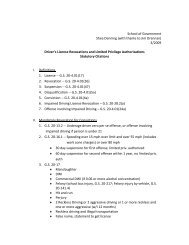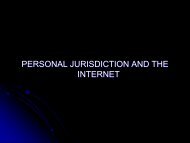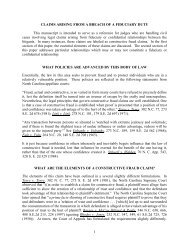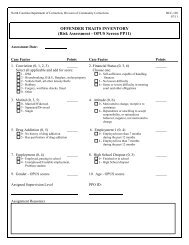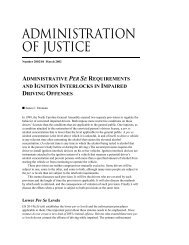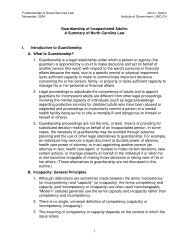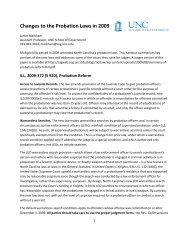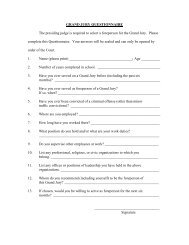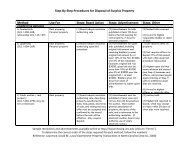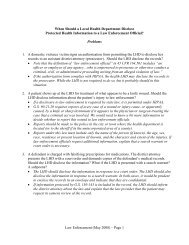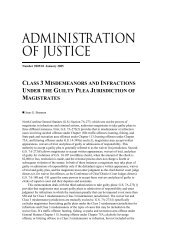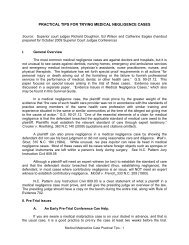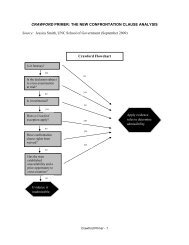Handout 1 - School of Government - University of North Carolina at ...
Handout 1 - School of Government - University of North Carolina at ...
Handout 1 - School of Government - University of North Carolina at ...
You also want an ePaper? Increase the reach of your titles
YUMPU automatically turns print PDFs into web optimized ePapers that Google loves.
Social Services Attorneys’ Winter/Spring Conference<br />
Chapel Hill, NC<br />
February 26 - 27, 2009<br />
CASE UPDATE<br />
Cases Filed from July 1, 2008, through February 17, 2009<br />
Janet Mason<br />
<strong>School</strong> <strong>of</strong> <strong>Government</strong><br />
The <strong>University</strong> <strong>of</strong> <strong>North</strong> <strong>Carolina</strong> <strong>at</strong> Chapel Hill<br />
(919) 966-4246<br />
mason@sog.unc.edu
ABUSE, NEGLECT, DEPENDENCY<br />
Jurisdiction<br />
• When a custody order had been entered in another st<strong>at</strong>e, a N.C. court had jurisdiction to enter a<br />
nonsecure custody order, but erred in proceeding to adjudic<strong>at</strong>ion when the record failed to show th<strong>at</strong><br />
N.C. had jurisdiction under the UCCJEA to modify another st<strong>at</strong>e’s order.<br />
In re J.W.S., ___ N.C. App. ___, 669 S.E.2d 850 (12/16/08).<br />
http://www.aoc.st<strong>at</strong>e.nc.us/www/public/coa/opinions/2008/080576-1.htm<br />
Facts: In 2000, a Family Court in New York granted the child’s mother temporary custody “pending the<br />
criminal court action,” after which, it said, either party could petition for custody. In 2006, respondent<br />
f<strong>at</strong>her filed a divorce action in N.C. and signed a one-year apartment lease. A couple who lived with him<br />
and the child reported th<strong>at</strong> respondent had assaulted the child. DSS filed a petition and obtained<br />
nonsecure custody. (Two additional petitions were filed on l<strong>at</strong>er d<strong>at</strong>es.) The child remained in nonsecure<br />
custody, and the court denied respondent’s motions to dismiss for lack <strong>of</strong> jurisdiction and failure to st<strong>at</strong>e a<br />
claim, ruling th<strong>at</strong> the court had properly exercised temporary emergency jurisdiction under the UCCJEA.<br />
After a hearing, in April 2007 the court adjudic<strong>at</strong>ed the child to be neglected and dependent. The order<br />
st<strong>at</strong>ed th<strong>at</strong> New York had opted not to exercise continuing jurisdiction and th<strong>at</strong> the st<strong>at</strong>es had agreed th<strong>at</strong><br />
N.C. was the most appropri<strong>at</strong>e forum to exercise jurisdiction. After a combined dispositional and<br />
permanency planning hearing, in May 2007 the court changed the permanent plan to adoption. In August<br />
DSS filed a motion to termin<strong>at</strong>e both parents’ rights. In December 2007 respondent filed a motion under<br />
G.S. 1A-1, Rule 60(b), asking the court to set aside the April adjudic<strong>at</strong>ion order, asserting th<strong>at</strong> the trial<br />
court lacked subject m<strong>at</strong>ter jurisdiction under the UCCJEA. The court denied the motion, and respondent<br />
appealed.<br />
Note: The facts were substantially more complic<strong>at</strong>ed, because respondent also sought relief from a<br />
federal court and from st<strong>at</strong>e courts in Texas and Virginia during the pendency <strong>of</strong> the m<strong>at</strong>ter in N.C.<br />
Held: Reversed.<br />
1. The trial properly exercised temporary emergency jurisdiction under G.S. 50A-204.<br />
2. Because a custody order had been entered in New York, the trial court could not proceed to<br />
adjudic<strong>at</strong>ion without determining th<strong>at</strong> it had jurisdiction to modify another st<strong>at</strong>e’s order. The record<br />
failed to show th<strong>at</strong> N.C. had jurisdiction because it did not establish<br />
a. th<strong>at</strong> New York had determined th<strong>at</strong> it did not have exclusive continuing jurisdiction, or<br />
b. th<strong>at</strong> New York had relinquished jurisdiction to N.C. after finding th<strong>at</strong> N.C. was a more appropri<strong>at</strong>e<br />
forum, or<br />
c. th<strong>at</strong> either New York or <strong>North</strong> <strong>Carolina</strong> had determined th<strong>at</strong> no party still resided in New York.<br />
Guardian ad Litem for Parent; Visit<strong>at</strong>ion<br />
• Where evidence and findings indic<strong>at</strong>ed a reasonable basis to believe respondent parent was<br />
incompetent or had diminished capacity, trial court’s failure to conduct a hearing to determine<br />
whether respondent needed a guardian ad litem was an abuse <strong>of</strong> discretion.<br />
• Court may not deleg<strong>at</strong>e to DSS discretion to determine parents’ visit<strong>at</strong>ion rights.<br />
In re M.H.B., ___ N.C. App. ___, 664 S.E.2d 583 (8/19/08).<br />
http://www.aoc.st<strong>at</strong>e.nc.us/www/public/coa/opinions/2008/080337-1.htm<br />
Facts: In a case in which the child was adjudic<strong>at</strong>ed abused and neglected, the court made findings<br />
1. th<strong>at</strong> respondent st<strong>at</strong>ed he suffered posttraum<strong>at</strong>ic stress disorder, was manic depressive and bipolar,<br />
was prescribed lithium but did not like its side effects, and self-medic<strong>at</strong>ed with marijuana.<br />
3
2. th<strong>at</strong> respondent received mental health tre<strong>at</strong>ment and th<strong>at</strong> while testifying he was weeping, crying,<br />
confounded, agit<strong>at</strong>ed, st<strong>at</strong>ed he wished someone would take his life, and st<strong>at</strong>ed th<strong>at</strong> he did not know<br />
why he was present <strong>at</strong> the adjudic<strong>at</strong>ory hearing.<br />
3. th<strong>at</strong> respondent thre<strong>at</strong>ened suicide after the petition was filed.<br />
4. th<strong>at</strong> respondent was mentally and emotionally unstable.<br />
The court ordered respondent to have a psychological evalu<strong>at</strong>ion, suspended visit<strong>at</strong>ion until DSS had the<br />
results <strong>of</strong> the evalu<strong>at</strong>ion, and authorized DSS then to determine wh<strong>at</strong> supervised visit<strong>at</strong>ion respondent<br />
would have.<br />
Held: Reversed and remanded.<br />
1. Although appointment <strong>of</strong> a guardian ad litem for an adult parent under G.S. 7B-602 is in the court’s<br />
discretion, given the evidence and findings rel<strong>at</strong>ing to respondent’s condition, the trial court abused<br />
its discretion by not conducting a hearing to determine whether a guardian ad litem for respondent<br />
should be appointed pursuant to G.S. 1A-1, Rule 17.<br />
2. The court erred in deleg<strong>at</strong>ing to DSS decisions regarding respondent’s visit<strong>at</strong>ion rights.<br />
Adjudic<strong>at</strong>ory Evidence<br />
• The rape shield law, G.S. 8C-1, Rule 412, can apply in civil cases to render most evidence <strong>of</strong> a<br />
victim’s sexual history inadmissible.<br />
• Evidence <strong>of</strong> a false alleg<strong>at</strong>ion is not excluded by Rule 412, which addresses only sexual activity.<br />
• Rule 12 does not preclude introduction <strong>of</strong> a victim’s inconsistent st<strong>at</strong>ements for impeachment.<br />
In re K.W., ___ N.C. App. ___, 666 S.E.2d 490 (9/16/08).<br />
http://www.aoc.st<strong>at</strong>e.nc.us/www/public/coa/opinions/2008/080535-1.htm<br />
Facts: The 13-year-old juvenile reported to a school counselor th<strong>at</strong> her f<strong>at</strong>her had been raping her for the<br />
past year. After the f<strong>at</strong>her viol<strong>at</strong>ed a protection plan by returning to the home, DSS filed a petition and<br />
obtained nonsecure custody. Based on the juvenile’s testimony and testimony by a doctor, the court<br />
adjudic<strong>at</strong>ed the juvenile to be abused, neglected, and dependent. On appeal, respondent f<strong>at</strong>her argued th<strong>at</strong><br />
the trial court erred by excluding from evidence a police report filed by the juvenile’s mother five years<br />
earlier, which said “sexual assault,” and on which an <strong>of</strong>ficer had written th<strong>at</strong> there was doubt as to<br />
whether the juvenile was telling the truth. The report included no other inform<strong>at</strong>ion and had become<br />
inactive. Respondent also asserted error based on the court’s exclusion from evidence <strong>of</strong> the juvenile’s<br />
Myspace website, which included provoc<strong>at</strong>ive pictures <strong>of</strong> the juvenile and indic<strong>at</strong>ed th<strong>at</strong> she had “had<br />
sex,” which contradicted her st<strong>at</strong>ements to police and her testimony.<br />
Held: Affirmed.<br />
1. Although G.S. 8C-1, Rule 412, is written with reference to criminal proceedings, it can be applied in<br />
a civil case to exclude evidence <strong>of</strong> a victim’s sexual conduct th<strong>at</strong> does not fall within an exception to<br />
the rule.<br />
2. The five-year-old police report did not involve sexual activity and should not have been excluded<br />
based on Rule 412, which does not apply to false alleg<strong>at</strong>ions. However, the report was properly<br />
excluded because it had no prob<strong>at</strong>ive value – it included no specific inform<strong>at</strong>ion, did not indic<strong>at</strong>e the<br />
n<strong>at</strong>ure <strong>of</strong> the alleged assault, and did not indic<strong>at</strong>e who had doubt about the then 8-year-old child’s<br />
veracity.<br />
3. Evidence <strong>of</strong> the Myspace page should have been admitted for impeachment purposes, but not as<br />
substantive evidence th<strong>at</strong> someone else caused the physical trauma to the juvenile. Failure to allow it<br />
into evidence was harmless, however, because respondent did not show th<strong>at</strong> the outcome would have<br />
been different if it had been admitted.<br />
4. In addition to abuse, the evidence supported adjudic<strong>at</strong>ions <strong>of</strong> neglect, because the home was an<br />
injurious environment, and dependency, because the parents refused to abide by the safety plan.<br />
4
Failure to Enter Timely Order<br />
• Appropri<strong>at</strong>e remedy for trial court’s failure to enter a timely order is mandamus.<br />
In re T.H.T., 362 N.C. 446, 665 S.E.2d 54 (8/27/08).<br />
http://www.aoc.st<strong>at</strong>e.nc.us/www/public/sc/opinions/2008/469-07-1.htm<br />
Facts: The trial court completed an adjudic<strong>at</strong>ion and disposition hearing on July 26, 2006 – adjudic<strong>at</strong>ing<br />
the child to be abused and neglected, awarding custody to the f<strong>at</strong>her, and granting the mother<br />
unsupervised visit<strong>at</strong>ion. No written order was entered until November 3, 2006, and there was no hearing<br />
pursuant to G.S. 7B-807 to determine the reason for delay in entry <strong>of</strong> the order. The mother appealed, and<br />
the court <strong>of</strong> appeals affirmed, with one judge dissenting on the basis th<strong>at</strong> the delay prejudiced the mother<br />
and required reversal.<br />
Held: Modified and affirmed.<br />
1. The Supreme Court held th<strong>at</strong> “when delayed entry <strong>of</strong> an otherwise proper order is the sole purported<br />
ground for appeal, a new hearing is not the proper remedy. Instead, a party’s remedy lies in<br />
mandamus,” an extraordinary court order mand<strong>at</strong>ing the performance <strong>of</strong> a clear <strong>of</strong>ficial duty imposed<br />
by law.<br />
2. In describing the remedy <strong>of</strong> mandamus, the court specified these required elements:<br />
a. Party seeking relief must show a clear legal right to the act requested.<br />
b. Defendant must have a clear legal duty to perform the act.<br />
c. The duty must rel<strong>at</strong>e to a ministerial act, not an act requiring the exercise <strong>of</strong> discretion.<br />
(Mandamus may be used to compel an <strong>of</strong>ficial to exercise his or her discretion, but not to direct<br />
wh<strong>at</strong> the result should be.)<br />
d. The <strong>of</strong>ficial must have neglected or refused to perform the act.<br />
e. There must not be an altern<strong>at</strong>ive legally adequ<strong>at</strong>e remedy.<br />
Authority to Modify Delinquency Disposition<br />
• In a delinquency case, trial court did not err in changing disposition from residential tre<strong>at</strong>ment to<br />
commitment to youth development center after finding th<strong>at</strong> funding for residential tre<strong>at</strong>ment was no<br />
longer available.<br />
In re D.G., ___ N.C. App. ___, 663 S.E.2d 458 (8/5/08) (appeal pending).<br />
http://www.aoc.st<strong>at</strong>e.nc.us/www/public/coa/opinions/2008/070402-1.htm<br />
Facts: The juvenile was adjudic<strong>at</strong>ed delinquent after admitting a first degree sex <strong>of</strong>fense based on having<br />
anal intercourse with a five-year-old child. Both DSS, which apparently had custody <strong>of</strong> the juvenile, and<br />
mental health recommended residential tre<strong>at</strong>ment. DSS expressed concern about funding for the<br />
placement because the juvenile was an illegal alien. The court counselor assured the court th<strong>at</strong> st<strong>at</strong>e funds<br />
were available. The court ordered placement in a residential sex <strong>of</strong>fender tre<strong>at</strong>ment facility as a Level 2<br />
disposition. Five months l<strong>at</strong>er a motion for review was filed asserting th<strong>at</strong> funding for the placement was<br />
no longer available and asking th<strong>at</strong> the disposition be modified, and the juvenile filed a motion asking the<br />
court to compel the st<strong>at</strong>e to provide him with sex <strong>of</strong>fender tre<strong>at</strong>ment. Evidence included a letter from the<br />
<strong>at</strong>torney for mental health st<strong>at</strong>ing th<strong>at</strong> the juvenile was not a qualified alien and th<strong>at</strong> mental health could<br />
not provide funding for custodial sex <strong>of</strong>fender tre<strong>at</strong>ment. The letter was based on an opinion from the<br />
Office <strong>of</strong> the N.C. Attorney General. The trial court found th<strong>at</strong> under st<strong>at</strong>e and federal law funding for the<br />
placement was no longer available. The court denied the juvenile’s motion to compel and amended the<br />
disposition to commit the juvenile to a youth development center for an indefinite time not to exceed his<br />
nineteenth birthday. The juvenile appealed.<br />
Holding: Affirmed.<br />
5
1. The trial court’s finding th<strong>at</strong> funding was not available was supported by competent evidence and<br />
therefore conclusive on appeal. Evidence included testimony from mental health and DSS personnel<br />
th<strong>at</strong> they had explored all avenues <strong>of</strong> funding and th<strong>at</strong> funding was not available due to federal law.<br />
2. The court properly ruled th<strong>at</strong> it could not compel the provision <strong>of</strong> residential tre<strong>at</strong>ment in viol<strong>at</strong>ion <strong>of</strong><br />
federal law.<br />
3. The facts constituted a change <strong>of</strong> circumstances and justified modific<strong>at</strong>ion <strong>of</strong> the disposition under<br />
G.S. 7B-2600.<br />
Dissent: Judge Wynn dissented on the basis th<strong>at</strong><br />
• the trial court had not been presented any clear administr<strong>at</strong>ive or st<strong>at</strong>utory law regarding the funding<br />
question;<br />
• the alleg<strong>at</strong>ions and arguments <strong>of</strong> mental health and DSS did not constitute competent evidence;<br />
• the “opinion” from the Attorney General’s Office actually was just an advisory letter th<strong>at</strong> had no legal<br />
force or effect;<br />
• the court’s “finding” about lack <strong>of</strong> funding was actually a conclusion <strong>of</strong> law th<strong>at</strong> was not supported by<br />
the evidence or findings;<br />
• there had not been a legal determin<strong>at</strong>ion th<strong>at</strong> sexual <strong>of</strong>fender tre<strong>at</strong>ment is an impermissible “public<br />
benefit” within the meaning <strong>of</strong> the relevant federal law.<br />
Appealability <strong>of</strong> Order<br />
• A nonsecure custody order is not an appealable order.<br />
• DSS had no right to appeal denial <strong>of</strong> its motion seeking review <strong>of</strong> an earlier nonsecure custody order<br />
th<strong>at</strong> directed DSS to make foster care board payments to kinship care providers.<br />
In re A.T., ___ N.C. App. ___, 662 S.E.2d 917 (7/15/08).<br />
http://www.aoc.st<strong>at</strong>e.nc.us/www/public/coa/opinions/2008/080223-1.htm<br />
Facts:<br />
3/06 DSS substanti<strong>at</strong>ed neglect and child was placed voluntarily in kinship care<br />
7/07 DSS filed petition alleging child was neglected; court held nonsecure custody hearing<br />
9/07 – nonsecure custody order entered, leaving custody with DSS and ordering DSS to pay foster<br />
care board r<strong>at</strong>e to the kinship care providers, effective 3/06<br />
– adjudic<strong>at</strong>ion and disposition orders entered, continuing requirement th<strong>at</strong> DSS pay foster<br />
care board r<strong>at</strong>e to care providers<br />
10/07 – after a review hearing, court ordered th<strong>at</strong> custody remain with DSS<br />
– DSS filed motion asking court to review the foster care board r<strong>at</strong>e payment provision in the<br />
nonsecure custody order, arguing th<strong>at</strong> it improperly ordered payment from 3/06, when<br />
children had been in DSS custody only since 7/07<br />
After a hearing the trial court denied DSS’s motion, and DSS appealed.<br />
Held: Appeal dismissed.<br />
1. DSS had no right to appeal the earlier nonsecure custody order or the order denying its motion for<br />
review <strong>of</strong> th<strong>at</strong> order.<br />
2. Nonsecure custody orders are excluded from the list <strong>of</strong> appealable orders in G.S. 7B-1001, and the<br />
order denying DSS’s motion was neither a final order nor an order finding an absence <strong>of</strong> jurisdiction,<br />
where the court did not rule th<strong>at</strong> it lacked subject m<strong>at</strong>ter jurisdiction but only found as a fact th<strong>at</strong> it<br />
did not have jurisdiction during a portion <strong>of</strong> the time for which it had ordered payment <strong>of</strong> the foster<br />
care board r<strong>at</strong>e.<br />
3. The court <strong>of</strong> appeals did not consider the merits <strong>of</strong> any claim th<strong>at</strong> the order requiring DSS to pay the<br />
foster care board r<strong>at</strong>e or to pay it for a particular period <strong>of</strong> time was improper.<br />
6
Issuance <strong>of</strong> Summons to Child<br />
TERMINATION OF PARENTAL RIGHTS<br />
1. Subject m<strong>at</strong>ter jurisdiction <strong>at</strong>taches when a summons is issued.<br />
2. Defects or irregularities in the summons or in service <strong>of</strong> process rel<strong>at</strong>e to personal, not subject<br />
m<strong>at</strong>ter, jurisdiction and can be waived.<br />
In re J.T., ___ N.C. ___, ___ S.E.2d ___ (2/6/09), reversing In re J.T., ___ N.C. App. ___, 657 S.E.2d<br />
692 (2008).<br />
http://www.aoc.st<strong>at</strong>e.nc.us/www/public/sc/opinions/2009/pdf/155-08-1.pdf<br />
Facts: In an action to termin<strong>at</strong>e parental rights, a summons was issued, but it did not name the child as a<br />
respondent and the summons was not served on the child’s guardian ad litem or <strong>at</strong>torney advoc<strong>at</strong>e. Both<br />
the GAL and <strong>at</strong>torney advoc<strong>at</strong>e particip<strong>at</strong>ed fully in the hearing, however, without raising any objection<br />
to the summons or service <strong>of</strong> process. The court <strong>of</strong> appeals reversed the order termin<strong>at</strong>ing parental rights,<br />
holding th<strong>at</strong> the failure to name the child as a respondent in the summons deprived the trial court <strong>of</strong><br />
subject m<strong>at</strong>ter jurisdiction.<br />
Held: Reversed.<br />
The Supreme Court held th<strong>at</strong><br />
1. the trial court obtained subject m<strong>at</strong>ter jurisdiction when a summons was issued, and any problem with<br />
the summons or service <strong>of</strong> process rel<strong>at</strong>ed only to personal jurisdiction;<br />
2. the <strong>at</strong>torney advoc<strong>at</strong>e and GAL waived any issue with respect to defects or irregularities in process or<br />
service <strong>of</strong> process by particip<strong>at</strong>ing in the proceeding.<br />
On 2/6/09 the Supreme Court also granted DSS’s petition for discretionary review in In re I.D.G., ___<br />
N.C. App. ___, 655 S.E.2d 858 (2008), for the limited purpose <strong>of</strong> remanding to the court <strong>of</strong> appeals for<br />
reconsider<strong>at</strong>ion in light <strong>of</strong> J.T. (above). (Court <strong>of</strong> appeals had held th<strong>at</strong> failure to issue summons to the<br />
child when a petition to termin<strong>at</strong>e parental rights was filed deprived trial court <strong>of</strong> subject m<strong>at</strong>ter<br />
jurisdiction.)<br />
The Supreme Court’s holding in J.T. would affect the court’s reasoning, but not its conclusion, in the<br />
following recent cases:<br />
• In re S.L.T., ___ N.C. App. ___, 670 S.E.2d 922 (1/20/09) (holding th<strong>at</strong> juvenile need not be named<br />
as respondent if the juvenile is named in the caption <strong>of</strong> the summons and the guardian ad litem<br />
certifies th<strong>at</strong> the juvenile was served).<br />
• In re S.N., ___ N.C. App. ___, 669 S.E.2d 55 (12/2/08) (holding th<strong>at</strong> trial court had subject m<strong>at</strong>ter<br />
jurisdiction where the summons named the child in the caption; named the child’s guardian ad litem,<br />
but not the child, as a respondent; and was served with the petition on the child’s guardian ad litem).<br />
• In re N.C.H., ___ N.C. App. ___, 665 S.E.2d 812 (9/2/08) (appeal pending); and<br />
In re S.D.J., ___ N.C. App. ___, 665 S.E.2d 818 (9/2/08)<br />
(both holding th<strong>at</strong> trial court had subject m<strong>at</strong>ter jurisdiction when juveniles were named in the caption<br />
<strong>of</strong> the summonses and the juveniles’ represent<strong>at</strong>ives certified th<strong>at</strong> the juveniles were served).<br />
The Supreme Court’s holding in J.T. effectively overrules one holding in the following recent decision:<br />
• In re K.J.L., ___ N.C. App. ___, 670 S.E.2d 269 (12/16/08) (trial court did not have subject m<strong>at</strong>ter<br />
jurisdiction because no summons was issued to the child or served on the child’s guardian ad litem).<br />
However, see the summary below for the court’s other holding, which may not be affected by J.T.<br />
7
• The trial court did not have subject m<strong>at</strong>ter jurisdiction because, in the underlying case in which DSS<br />
was awarded custody, no proper summons was ever issued because the summons was not signed by<br />
a clerk or assistant or deputy clerk.<br />
In re K.J.L., ___ N.C. App. ___, 670 S.E.2d 269 (12/16/08).<br />
http://www.aoc.st<strong>at</strong>e.nc.us/www/public/coa/opinions/2008/080284-2.htm<br />
Facts: Parents appealed from an order termin<strong>at</strong>ing their parental rights, arguing th<strong>at</strong> the trial court lacked<br />
subject m<strong>at</strong>ter jurisdiction.<br />
Held: Vac<strong>at</strong>ed.<br />
1. In the underlying neglect/dependency action, in which DSS obtained custody <strong>of</strong> the child, no<br />
summons was ever properly issued because the summons was not signed by a clerk or assistant or<br />
deputy clerk. Therefore the court lacked subject m<strong>at</strong>ter jurisdiction in the underlying case. [Although<br />
the opinion does not say this directly, because the order giving DSS custody was void for lack <strong>of</strong><br />
jurisdiction, DSS did not have standing to petition for termin<strong>at</strong>ion <strong>of</strong> parental rights.]<br />
2. [This holding was effectively overruled by In re J.T., above.] Although the summons in the<br />
termin<strong>at</strong>ion <strong>of</strong> parental rights case named the child in the caption, it was not served on or accepted by<br />
the child’s guardian ad litem. Therefore, following other recent opinions <strong>of</strong> the court, the trial court<br />
lacked subject m<strong>at</strong>ter jurisdiction.]<br />
UCCJEA<br />
• An order entered pursuant to temporary emergency jurisdiction under the UCCJEA remains in effect<br />
until an order is received from another st<strong>at</strong>e th<strong>at</strong> has jurisdiction.<br />
• N.C. became the child’s home st<strong>at</strong>e when the child and parent had been here more than six months<br />
and no action had been filed in another st<strong>at</strong>e.<br />
• Failure to serve one <strong>of</strong> the parents in the underlying juvenile case did not deprive the court <strong>of</strong> subject<br />
m<strong>at</strong>ter jurisdiction in a l<strong>at</strong>er termin<strong>at</strong>ion action.<br />
In re E.X.J., ___ N.C. App. ___, 662 S.E.2d 24 (6/17/08), affirmed per curiam, ___ N.C. ___, ___<br />
S.E.2d ___ (2/6/09).<br />
http://www.aoc.st<strong>at</strong>e.nc.us/www/public/coa/opinions/2008/071235-1.htm<br />
http://www.aoc.st<strong>at</strong>e.nc.us/www/public/sc/opinions/2009/pdf/341-08-1.pdf<br />
Facts: In April 2005, the day after arriving in N.C. from Alabama, respondent (mother) took her two<br />
children to DSS for placement in foster care, telling the social worker th<strong>at</strong> she was not mentally or<br />
financially able to care for them and had left Alabama to escape domestic violence and other marital<br />
problems. DSS filed a petition and obtained nonsecure custody. Respondent was served properly but the<br />
summons mailed to the f<strong>at</strong>her in Alabama was returned “unclaimed.” Notice <strong>of</strong> an August, 2005,<br />
adjudic<strong>at</strong>ion hearing was sent to the f<strong>at</strong>her, who wrote a letter to the clerk st<strong>at</strong>ing th<strong>at</strong> he could not <strong>at</strong>tend<br />
but had a good job and would have his own home soon. At the hearing the mother stipul<strong>at</strong>ed to facts<br />
rel<strong>at</strong>ing to dependency and the court adjudic<strong>at</strong>ed the children dependent and left them in DSS custody. At<br />
a permanency planning hearing in October, 2006, the court ceased reunific<strong>at</strong>ion efforts and changed the<br />
permanent plan to adoption. In December, 2006, DSS filed motions to termin<strong>at</strong>e the parents’ rights.<br />
Because the f<strong>at</strong>her had never been served in the dependency case, DSS in April, 2007, filed a petition to<br />
termin<strong>at</strong>e his rights and had a summons issued to him. Both parents were properly served. Both<br />
respondents moved to dismiss for lack <strong>of</strong> subject m<strong>at</strong>ter jurisdiction and the f<strong>at</strong>her also moved to dismiss<br />
for lack <strong>of</strong> personal jurisdiction because he was not served in the underlying case. The court denied the<br />
motions, heard evidence, and entered an order termin<strong>at</strong>ing both parents’ rights.<br />
Held: Affirmed.<br />
1. The court rejected respondents’ argument th<strong>at</strong> DSS lacked standing to petition for termin<strong>at</strong>ion<br />
because it was not granted custody by a court <strong>of</strong> competent jurisdiction.<br />
8
a. Although N.C. was not the children’s home st<strong>at</strong>e when the underlying petition was filed, it was<br />
clear from the record th<strong>at</strong> N.C. had jurisdiction to enter the nonsecure custody order pursuant to<br />
the temporary emergency custody provisions <strong>of</strong> the UCCJEA.<br />
b. If jurisdiction is clear from the record, the trial court is not required to make specific findings <strong>of</strong><br />
fact to support a conclusion th<strong>at</strong> it has jurisdiction, although doing so is the better practice.<br />
c. Because no action was ever filed in Alabama, the temporary emergency order remained in effect<br />
and the N.C. court had jurisdiction when it gave DSS custody.<br />
2. Because the children and mother had been in N.C. more than two years when the termin<strong>at</strong>ion action<br />
was filed and no action had been initi<strong>at</strong>ed in Alabama, N.C. had become the children’s home st<strong>at</strong>e<br />
and the N.C. court had jurisdiction to termin<strong>at</strong>e parental rights.<br />
3. The fact th<strong>at</strong> the f<strong>at</strong>her was never served with a summons in the underlying case did not deprive the<br />
court <strong>of</strong> subject m<strong>at</strong>ter jurisdiction in the termin<strong>at</strong>ion action.<br />
a. In an abuse, neglect, or dependency case failure to serve one <strong>of</strong> the parents, if the other is<br />
properly served, does not deprive the court <strong>of</strong> subject m<strong>at</strong>ter jurisdiction. In re Poole, 151 N.C.<br />
App. 472, 568 S.E.2d 200 (2002), (Timmons-Goodson, J., dissenting), adopted per curiam, 357<br />
N.C. 151, 579 S.E.2d 248 (2003).<br />
b. “Motions in the cause and original petitions for termin<strong>at</strong>ion <strong>of</strong> parental rights may be sustained<br />
irrespective <strong>of</strong> earlier juvenile court activity,” citing In re O.C., 171, N.C. App. 457, 615 S.E.2d<br />
391 (2005).<br />
Service <strong>of</strong> Motion and Notice<br />
In an action to termin<strong>at</strong>e parental rights initi<strong>at</strong>ed by motion in a pending case, DSS’s failure to serve<br />
respondent with notice was error; however,<br />
1. th<strong>at</strong> failure did not deprive the court <strong>of</strong> subject m<strong>at</strong>ter jurisdiction, and<br />
2. respondent waived any objection by filing a response and particip<strong>at</strong>ing in the hearing.<br />
In re C.S.B., ___ N.C. App. ___, 669 S.E.2d 15 (12/2/08).<br />
http://www.aoc.st<strong>at</strong>e.nc.us/www/public/coa/opinions/2008/080881-1.htm<br />
Facts: DSS initi<strong>at</strong>ed a termin<strong>at</strong>ion proceeding by filing a motion in the pending neglect proceeding. DSS<br />
served respondent and her <strong>at</strong>torney with the motion, but not the notice required by G.S. 7B-1106.1.<br />
Respondent filed a response to the motion and particip<strong>at</strong>ed in the hearing through her <strong>at</strong>torney, without<br />
objecting to the sufficiency <strong>of</strong> notice. The court termin<strong>at</strong>ed respondent’s rights.<br />
Held: Affirmed.<br />
1. Failure to serve the required notice on respondent did not affect the trial court’s subject m<strong>at</strong>ter<br />
jurisdiction, because the court had already acquired jurisdiction in the underlying proceeding.<br />
2. Respondent did not preserve for appeal any objection to the lack <strong>of</strong> notice, because she filed a<br />
response and particip<strong>at</strong>ed in the hearing without raising the issue.<br />
9
Guardian ad Litem for Parent<br />
In an action to termin<strong>at</strong>e parental rights,<br />
1. the sign<strong>at</strong>ure <strong>of</strong> respondent parent’s guardian ad litem on the notice <strong>of</strong> appeal did not s<strong>at</strong>isfy the<br />
requirement th<strong>at</strong> the respondent sign the notice.<br />
2. the role <strong>of</strong> a parent’s guardian ad litem in a termin<strong>at</strong>ion case is to provide assistance, not to<br />
substitute his or her judgment or decisions for those <strong>of</strong> the parent.<br />
In re L.B., 187 N.C. App. 326, 653 S.E.2d 240 (12/4/07), affirmed per curiam, 362 N.C. 507, 666<br />
S.E.2d 751 (10/10/08).<br />
http://www.aoc.st<strong>at</strong>e.nc.us/www/public/coa/opinions/2007/070549-1.htm<br />
Facts: In an action to termin<strong>at</strong>e the parents’ rights, guardians ad litem were appointed for both parents<br />
pursuant to G.S. 7B-1101.1. After the court entered an order termin<strong>at</strong>ing both parents’ rights, both<br />
parents’ <strong>at</strong>torneys and guardians ad litem signed notices <strong>of</strong> appeal. Petitioner made a motion to dismiss<br />
the appeal for failure to comply with Rule 3A <strong>of</strong> the Rules <strong>of</strong> Appell<strong>at</strong>e Procedure.<br />
Held: Appeal dismissed.<br />
1. In juvenile cases, Rule 3A <strong>of</strong> the Rules <strong>of</strong> Appell<strong>at</strong>e Procedure requires th<strong>at</strong> both trial counsel and the<br />
appellant sign the notice <strong>of</strong> appeal. The court held th<strong>at</strong> the sign<strong>at</strong>ure <strong>of</strong> the respondent parent’s<br />
guardian ad litem did not suffice to s<strong>at</strong>isfy the requirement th<strong>at</strong> the parent sign. Failure <strong>of</strong> the parents<br />
to sign the notice <strong>of</strong> appeal deprived the court <strong>of</strong> appeals <strong>of</strong> jurisdiction to consider the appeal.<br />
2. The court <strong>of</strong> appeals contrasted standards for appointing a guardian for an adult under G.S. Chapter<br />
35A, which requires an adjudic<strong>at</strong>ion <strong>of</strong> incompetence, and those for appointing a guardian ad litem<br />
under G.S. 7B-1101.1, which requires only a reasonable basis to believe the parent is incompetent or<br />
has diminished capacity. The court also noted th<strong>at</strong> the provision for appointing a GAL for a minor<br />
parent, unlike the provision applicable to adult parents, specifically references appointment pursuant<br />
to G.S. 1A-1, Rule 17. The court concluded th<strong>at</strong> the role <strong>of</strong> a guardian ad litem appointed under the<br />
termin<strong>at</strong>ion st<strong>at</strong>ute is much more limited than th<strong>at</strong> <strong>of</strong> a guardian under Chapter 35A or a guardian ad<br />
litem under Rule 17 and does not include exercising legal rights in the place <strong>of</strong> the respondent parent.<br />
GAL for parent; willfully leaving child in care<br />
• Trial court abused its discretion by failing to hold a hearing to determine whether respondent needed<br />
a guardian ad litem when circumstances raised substantial question as to whether she was competent<br />
or had diminished capacity.<br />
• The “willfulness” required to establish the ground <strong>of</strong> leaving the child in foster care is “less than<br />
willful abandonment.”<br />
In re N.A.L., ___ N.C. App. ___, 666 S.E.2d 768 (10/7/08).<br />
http://www.aoc.st<strong>at</strong>e.nc.us/www/public/coa/opinions/2008/080510-1.htm<br />
Facts: In addition to other grounds for termin<strong>at</strong>ion <strong>of</strong> parental rights, DSS alleged th<strong>at</strong> both parents were<br />
incapable <strong>of</strong> providing proper care and supervision. The petition alleged th<strong>at</strong> respondent mother had<br />
problems controlling her anger, tended to be aggressive, and lacked understanding <strong>of</strong> the earlier neglect<br />
adjudic<strong>at</strong>ion. Evidence showed th<strong>at</strong> she had an IQ score <strong>of</strong> 74 and was diagnosed as having personality<br />
disorder and borderline intellectual functioning. The trial court found th<strong>at</strong> she had significant mental<br />
health issues th<strong>at</strong> affected her ability to parent. No one moved for appointment <strong>of</strong> a guardian ad litem for<br />
respondent mother in the termin<strong>at</strong>ion proceeding and the court did not appoint one.<br />
Although the court had returned custody <strong>of</strong> one child to the f<strong>at</strong>her <strong>at</strong> one point, custody had been<br />
returned to DSS after respondent f<strong>at</strong>her viol<strong>at</strong>ed the court’s order th<strong>at</strong> he allow no contact between the<br />
child and the mother. Although he had made some progress, he was unemployed, had not maintained<br />
suitable housing, and had not particip<strong>at</strong>ed in court-ordered counseling.<br />
10
Held: Affirmed in part; reversed and remanded in part.<br />
1. The court reversed and remanded with respect to respondent mother, holding th<strong>at</strong> the trial court erred<br />
by not conducting a hearing to determine whether she needed a guardian ad litem. The error was not<br />
in failing to appoint a guardian ad litem, but in failing to conduct a hearing and exercise discretion<br />
one way or the other about whether to appoint one.<br />
2. The court <strong>of</strong> appeals affirmed the portion <strong>of</strong> the order termin<strong>at</strong>ing respondent f<strong>at</strong>her’s rights on the<br />
ground <strong>of</strong> willfully leaving the children in foster care for more than a year without making reasonable<br />
progress. “Willfulness,” the court said, may be found even when a parent has made some progress.<br />
3. The court also reviewed the trial court’s “best interest” findings and held th<strong>at</strong> the trial court did not<br />
abuse its discretion in concluding th<strong>at</strong> termin<strong>at</strong>ion <strong>of</strong> f<strong>at</strong>her’s rights was in the children’s best interest.<br />
• Whether to conduct a hearing on the need for a GAL for a parent is in the trial court’s discretion.<br />
• Mere alleg<strong>at</strong>ion <strong>of</strong> the incapacity ground for termin<strong>at</strong>ion does not require appointment <strong>of</strong> a GAL.<br />
In re C.G.A.M., ___ N.C. App. ___, 671 S.E.2d 1 (10/21/08).<br />
http://www.aoc.st<strong>at</strong>e.nc.us/www/public/coa/opinions/2008/080617-1.htm<br />
Facts: The children came into care based on a stipul<strong>at</strong>ion th<strong>at</strong> they were dependent. More than a year<br />
l<strong>at</strong>er DSS filed a petition to termin<strong>at</strong>e respondent f<strong>at</strong>her’s rights, alleging th<strong>at</strong> he was incapable <strong>of</strong> caring<br />
for the children, th<strong>at</strong> he had a long criminal record and pending charges, th<strong>at</strong> he had not completed courtordered<br />
substance abuse and domestic violence counseling, th<strong>at</strong> he had not maintained contact with DSS,<br />
and th<strong>at</strong> he had provided no child support for the preceding six months. (The mother relinquished the<br />
child for adoption.) The court termin<strong>at</strong>ed respondent’s rights on the grounds <strong>of</strong> neglect in the form <strong>of</strong><br />
willful abandonment; willfully leaving the children in foster care for more than a year without making<br />
reasonable progress; incapacity to care for the children, which could be expected to last for the<br />
foreseeable future; and willfully failing to provide a reasonable portion <strong>of</strong> the cost <strong>of</strong> the children’s care.<br />
Held: Affirmed.<br />
1. The trial court did not abuse its discretion by failing to appoint a guardian ad litem for respondent or<br />
conduct a hearing on whether to appoint a GAL. Alleg<strong>at</strong>ion <strong>of</strong> the incapacity ground for termin<strong>at</strong>ion,<br />
by itself, does not require appointment <strong>of</strong> a GAL for the parent. Contrasting this case with In re<br />
N.A.L., ___ N.C. App. ___, 666 S.E.2d 768 (10/7/08), the court st<strong>at</strong>ed th<strong>at</strong> nothing in respondent’s<br />
conduct <strong>at</strong> the hearing in this case raised a question about his competence.<br />
2. The court rejected respondent’s argument th<strong>at</strong> there was not clear, cogent, and convincing evidence to<br />
support a ground for termin<strong>at</strong>ion. The court reviewed only the ground <strong>of</strong> willfully leaving the child in<br />
foster care, etc., and affirmed on the basis <strong>of</strong> th<strong>at</strong> ground.<br />
3. Finding th<strong>at</strong> the trial court addressed the st<strong>at</strong>utory factors rel<strong>at</strong>ing to be interest, the court rejected<br />
respondent’s argument th<strong>at</strong> the trial court abused its discretion by termin<strong>at</strong>ing his rights.<br />
Rules <strong>of</strong> Civil Procedure<br />
• Trial court erred in allowing amendment <strong>of</strong> the petition to conform to the evidence.<br />
• G.S. 1A-1, Rule 15, does not apply in a termin<strong>at</strong>ion proceeding to permit amendment <strong>of</strong> the petition<br />
or motion to conform to evidence presented <strong>at</strong> the adjudic<strong>at</strong>ion hearing.<br />
In re B.L.H., ___ N.C. App. ___, 660 S.E.2d 255 (5/6/08), affirmed per curiam, 362 N.C. 674, 669<br />
S.E.2d 320 (12/12/08).<br />
http://www.aoc.st<strong>at</strong>e.nc.us/www/public/coa/opinions/2008/071313-2.htm<br />
http://www.aoc.st<strong>at</strong>e.nc.us/www/public/sc/opinions/2008/259-08-1.htm<br />
Facts: DSS filed a petition to termin<strong>at</strong>e respondent’s rights on two grounds – neglect and non-payment <strong>of</strong><br />
child support. After testimony <strong>of</strong> the social worker, the trial court granted DSS’s motion to amend the<br />
11
petition to conform to the evidence and allege the additional ground <strong>of</strong> willfully leaving the child in foster<br />
care for more than a year without making reasonable progress in correcting the conditions th<strong>at</strong> led to<br />
placement. Respondent objected. The court adjudic<strong>at</strong>ed only this ground and entered an order termin<strong>at</strong>ing<br />
respondent’s rights.<br />
Held: Reversed.<br />
1. The court held th<strong>at</strong> it was error for the trial court to allow the amendment to conform to the evidence,<br />
because<br />
a. Article 11 <strong>of</strong> G.S. Chapter 7B is silent with regard to such amendments, and<br />
b. applying G.S. 1A-1, Rule 15, to allow the amendment amounted to conferring a new procedural<br />
right, which the court has held it will not do in termin<strong>at</strong>ion cases.<br />
2. The court then held th<strong>at</strong> the petition as filed did not give sufficient notice th<strong>at</strong> the added ground might<br />
be litig<strong>at</strong>ed, because the children had not been in care for a year when the petition was filed and the<br />
ground could not have been alleged <strong>at</strong> th<strong>at</strong> time.<br />
Rules <strong>of</strong> Civil Procedure; Evidence<br />
• The court may not termin<strong>at</strong>e parental rights based solely on documentary evidence and must conduct<br />
a proper, independent hearing.<br />
• Summary termin<strong>at</strong>ion <strong>of</strong> parental rights is not permitted.<br />
In re A.M., ___ N.C. App. ___, 665 S.E.2d 534 (9/2/08).<br />
http://www.aoc.st<strong>at</strong>e.nc.us/www/public/coa/opinions/2008/080484-1.htm<br />
Facts: Respondents did not appear <strong>at</strong> the hearing on DSS’s motion to termin<strong>at</strong>e parental rights, and the<br />
trial court denied their counsel’s request for a continuance. DSS asked the court to take judicial notice <strong>of</strong><br />
previous findings in the record and to accept and include in its order written reports as evidence to<br />
establish grounds to termin<strong>at</strong>e respondents’ rights. The court received the reports into evidence over<br />
respondents’ objections and entered an order termin<strong>at</strong>ing rights based on the written reports <strong>of</strong> DSS and<br />
the guardian ad litem, prior court orders, and oral arguments by the <strong>at</strong>torneys.<br />
Holding: Reversed and remanded.<br />
1. G.S. 1A-1, Rule 43, furthers the purposes <strong>of</strong> the Juvenile Code and, when read in conjunction with<br />
language in the Code, requires th<strong>at</strong> some testimony be taken orally in open court in a hearing to<br />
termin<strong>at</strong>e parental rights.<br />
2. Termin<strong>at</strong>ion <strong>of</strong> parental rights may not occur through a summary proceeding.<br />
3. It was not improper for the court to consider properly admitted reports, documentary evidence, and<br />
prior orders, but a witness or witnesses must be sworn or affirmed and tendered to give some<br />
testimony. The court noted th<strong>at</strong> the opinion should not be construed as requiring “extensive oral<br />
testimony.”<br />
Note: The court <strong>of</strong> appeals st<strong>at</strong>ed th<strong>at</strong> the trial court’s “[c]onsider<strong>at</strong>ion <strong>of</strong> written reports [from DSS and<br />
the guardian ad litem] . . . was proper.” It is not clear whether th<strong>at</strong> was because they fell within an<br />
exception to the hearsay rule, or because the adjudic<strong>at</strong>ion and disposition hearings were combined, or for<br />
some other reason.<br />
• Petitioner must present some live testimony <strong>at</strong> a termin<strong>at</strong>ion hearing.<br />
In re N.B., ___ N.C. App. ___, 670 S.E.2d 923 (1/20/09).<br />
http://www.aoc.st<strong>at</strong>e.nc.us/www/public/coa/opinions/2009/081082-1.htm<br />
Facts: DSS filed a motion for termin<strong>at</strong>ion <strong>of</strong> parental rights in a pending neglect case. At the hearing,<br />
DSS <strong>of</strong>fered as evidence prior court orders and the written reports <strong>of</strong> DSS and the guardian ad litem. The<br />
only live testimony was from respondent mother. The court termin<strong>at</strong>ed respondent’s rights.<br />
12
Held: Reversed and remanded.<br />
As it did in In re A.M., ___ N.C. App. ___, 665 S.E.2d 534 (2008), the court <strong>of</strong> appeals held th<strong>at</strong> the trial<br />
court must hear some testimony <strong>at</strong> a hearing on termin<strong>at</strong>ion <strong>of</strong> parental rights. The court st<strong>at</strong>ed th<strong>at</strong><br />
respondent’s testimony did not support petitioner’s case and th<strong>at</strong>, by relying solely on written evidence<br />
and the arguments <strong>of</strong> counsel, the trial court failed to make an independent determin<strong>at</strong>ion <strong>of</strong> whether the<br />
neglect ground for termin<strong>at</strong>ion existed.<br />
• The court may not adjudic<strong>at</strong>e a ground for termin<strong>at</strong>ion th<strong>at</strong> is not alleged in the petition or motion.<br />
• Willful abandonment occurs only when the parent evidences an intent to forego all parental rights<br />
and duties.<br />
In re S.R.G., ___ N.C. App. ___, 671 S.E.2d 47 (1/20/09).<br />
http://www.aoc.st<strong>at</strong>e.nc.us/www/public/coa/opinions/2009/080954-1.htm<br />
Facts: The trial court adjudic<strong>at</strong>ed respondent’s child to be neglected and dependent and ordered<br />
respondent to take a variety <strong>of</strong> actions, including obtaining evalu<strong>at</strong>ions, receiving tre<strong>at</strong>ment for her drug<br />
addiction, having regular visits, finding independent housing, etc. After periods <strong>of</strong> respondent’s only<br />
partial compliance with the case plan and her continued use <strong>of</strong> drugs, the court changed the plan from<br />
reunific<strong>at</strong>ion to a concurrent plan <strong>of</strong> reunific<strong>at</strong>ion and adoption, and then to adoption. DSS filed a petition<br />
to termin<strong>at</strong>e parental rights and after a hearing the trial court termin<strong>at</strong>ed respondent’s rights on the sole<br />
ground <strong>of</strong> willful abandonment for a period <strong>of</strong> six months before the filing <strong>of</strong> the petition.<br />
Held: Reversed and remanded<br />
1. Much <strong>of</strong> the language in the trial court’s order rel<strong>at</strong>ed to factors th<strong>at</strong> were relevant to the ground <strong>of</strong><br />
willfully leaving the child in care for more than a year without making reasonable progress to correct<br />
conditions th<strong>at</strong> led to the child’s placement. Th<strong>at</strong> ground was not alleged in the petition and the court<br />
could not adjudic<strong>at</strong>e th<strong>at</strong> ground.<br />
2. Findings about respondent’s partial failure to comply with the case plan and her continued drug use<br />
did not support the ground <strong>of</strong> willful abandonment. Evidence showed th<strong>at</strong> during the relevant sixmonth<br />
period respondent <strong>at</strong>tended a court hearing, visited the child eleven times, and brought<br />
appropri<strong>at</strong>e toys and clothes to the visits.<br />
3. The evidence and findings failed to support a conclusion th<strong>at</strong> respondent demonstr<strong>at</strong>ed a “purposeful,<br />
deliber<strong>at</strong>ive and manifest willful determin<strong>at</strong>ion to forego all parental duties and relinquish all parental<br />
claims” to the child for a six-month period – the showing th<strong>at</strong> is required for an adjudic<strong>at</strong>ion <strong>of</strong><br />
willful abandonment.<br />
• Reports <strong>of</strong> drug screen results and letter from Alcohol and Drug Services were admissible under<br />
business records exception to the hearsay rule after social worker testimony laid proper found<strong>at</strong>ion.<br />
• The trial court may take judicial notice <strong>of</strong> prior proceedings and orders in a case and is presumed to<br />
disregard any incompetent evidence.<br />
In re S.D.J., ___ N.C. App. ___, 665 S.E.2d 818 (9/2/08).<br />
http://www.aoc.st<strong>at</strong>e.nc.us/www/public/coa/opinions/2008/080360-1.htm<br />
Facts: In addition to the jurisdiction issue described above, respondent argued th<strong>at</strong> the trial court erred in<br />
1. admitting into evidence reports <strong>of</strong> drug screen results and a letter from Alcohol and Drug Services<br />
over the objection <strong>of</strong> respondent’s <strong>at</strong>torney and<br />
2. taking judicial notice <strong>of</strong> and basing findings <strong>of</strong> fact on prior orders in the case, including those th<strong>at</strong><br />
involved a lesser standard <strong>of</strong> pro<strong>of</strong> than clear, cogent, and convincing evidence.<br />
Held: Affirmed.<br />
1. The reports and letter were properly admitted as evidence under the business records exception to the<br />
hearsay rule, where a social worker testified th<strong>at</strong> she had collected all but one <strong>of</strong> the samples and<br />
13
sealed them and shipped them to the labor<strong>at</strong>ory for testing, th<strong>at</strong> she relied on the reports in the<br />
ordinary course <strong>of</strong> her business, and th<strong>at</strong> the reports were collected as part <strong>of</strong> petitioner’s record in the<br />
case. A proper found<strong>at</strong>ion did not require authentic<strong>at</strong>ion by the person who made the records.<br />
2. The court noted th<strong>at</strong> it is “well established” th<strong>at</strong> a trial court may take judicial notice <strong>of</strong> earlier<br />
proceedings in the same case and th<strong>at</strong> the trial court is presumed to disregard any incompetent<br />
evidence. The court also found th<strong>at</strong> the trial court’s findings were supported by testimony in the case<br />
and were not based on the prior orders.<br />
Dispositional Authority<br />
• Trial court did not have subject m<strong>at</strong>ter jurisdiction to order th<strong>at</strong> the child be placed with a rel<strong>at</strong>ive<br />
following termin<strong>at</strong>ion <strong>of</strong> parental rights, because st<strong>at</strong>ute gives DSS exclusive placement authority<br />
when the child was in DSS custody <strong>at</strong> the time the termin<strong>at</strong>ion petition or motion was filed.<br />
In re I.T.P-L., ___ N.C. App. ___, 670 S.E.2d 282 (12/16/08).<br />
http://www.aoc.st<strong>at</strong>e.nc.us/www/public/coa/opinions/2008/080622-1.htm<br />
Facts: DSS petitioned for termin<strong>at</strong>ion <strong>of</strong> parental rights in the case <strong>of</strong> a child who had been adjudic<strong>at</strong>ed<br />
neglected and dependent, placed in the custody <strong>of</strong> DSS, and placed in foster care. After termin<strong>at</strong>ing both<br />
parents’ rights, the trial court granted legal and physical custody <strong>of</strong> the child to DSS but ordered<br />
placement with the m<strong>at</strong>ernal grandmother who was the guardian <strong>of</strong> the mother’s four other children, two<br />
<strong>of</strong> whom were also respondent f<strong>at</strong>her’s children. Both the parents and DSS appealed.<br />
Held: Affirmed in part and vac<strong>at</strong>ed in part.<br />
1. The court rejected respondents’ arguments rel<strong>at</strong>ing to<br />
a. subject m<strong>at</strong>ter jurisdiction, holding th<strong>at</strong> the summons was sufficient when it named the child in<br />
the caption and was served on the child’s guardian ad litem.<br />
b. sufficiency <strong>of</strong> the evidence, where error had not been assigned to major findings or to the<br />
conclusion <strong>of</strong> law.<br />
c. timely appointment <strong>of</strong> a guardian ad litem for the mother, where the GAL was appointed 17 days<br />
after the petition was filed and three months before the hearing.<br />
d. best interest.<br />
2. The trial court did not have jurisdiction to determine the child’s placement, because G.S. 7B-1112<br />
gives DSS exclusive placement authority following termin<strong>at</strong>ion <strong>of</strong> parental rights when the child was<br />
in DSS custody when the petition was filed.<br />
14
CHILD SUPPORT AND PATERNITY<br />
Support Modific<strong>at</strong>ion<br />
Devaney v. Miller, ___ N.C. App. ___, 662 S.E.2d 672 (7/1/08).<br />
http://www.aoc.st<strong>at</strong>e.nc.us/www/public/coa/opinions/2008/070788-1.htm<br />
The court <strong>of</strong> appeals affirmed the trial court’s dismissal <strong>of</strong> defendant’s motion to modify a child support<br />
order, holding th<strong>at</strong>:<br />
• when a child support order has been modified and a subsequent motion to modify is filed, the party<br />
seeking modific<strong>at</strong>ion must show a change in circumstances since the d<strong>at</strong>e <strong>of</strong> the most recent order.<br />
• an alleg<strong>at</strong>ion th<strong>at</strong> the parties’ incomes have changed, by itself, is not sufficient to support a motion<br />
to modify a child support order.<br />
New Hanover Child Support Enforcement, obo Dillon v. Rains, ___ N.C. App. ___, 666 S.E.2d 800<br />
(10/7/08).<br />
http://www.aoc.st<strong>at</strong>e.nc.us/www/public/coa/opinions/2008/071286-1.htm<br />
Facts: Defendant appealed from an order increasing his monthly child support oblig<strong>at</strong>ion from $300 to<br />
$591.<br />
Held: Affirmed in part, remanded in part.<br />
Business expenses. The court <strong>of</strong> appeals remanded for additional findings because the trial court’s findings<br />
were insufficient for a determin<strong>at</strong>ion <strong>of</strong> whether the trial court applied the guidelines appropri<strong>at</strong>ely. The<br />
trial court determined defendant’s monthly gross income by dividing by 12 the amount deposited in his<br />
personal bank account in a year. Although defendant was self-employed and presented evidence <strong>of</strong><br />
business expenses, the court’s order made no reference to business expenses.<br />
Other children in home. The court <strong>of</strong> appeals rejected defendant’s argument th<strong>at</strong> the trial court made<br />
insufficient findings about expenses rel<strong>at</strong>ed to the parties’ other children. The order and work sheet<br />
reflected th<strong>at</strong> each party was given a deduction for support <strong>of</strong> the other child in the party’s home. Detailed<br />
findings are not required and in this case the findings were sufficient. (The court noted th<strong>at</strong> defendant’s<br />
deduction would change if consider<strong>at</strong>ion <strong>of</strong> business expenses resulted in a reduction in his gross income.)<br />
Child support as income. The court <strong>of</strong> appeals also rejected defendant’s argument th<strong>at</strong> the trial court erred<br />
by including in the parties’ gross incomes the child support payments they received for other children,<br />
holding th<strong>at</strong> the child support guidelines do not exclude child support from income. The court also noted<br />
th<strong>at</strong> the majority <strong>of</strong> other st<strong>at</strong>es do exclude from income child support a parent receives for a child other<br />
than the one for whom support is being determined. The court also urged the Conference <strong>of</strong> Chief District<br />
Judges to consider the effect <strong>of</strong> not excluding support paid for another child and to indic<strong>at</strong>e clearly in the<br />
Guidelines how child support paid for another child should be tre<strong>at</strong>ed.<br />
Contempt<br />
Eakes v. Eakes, ___ N.C. App. ___, 669 S.E.2d 891 (12/16/08).<br />
http://www.aoc.st<strong>at</strong>e.nc.us/www/public/coa/opinions/2008/080248-1.htm<br />
Facts: Plaintiff (mother) and defendant (f<strong>at</strong>her) were divorced, and plaintiff was in possession <strong>of</strong> a $75,000<br />
fund th<strong>at</strong> belonged to defendant. A modific<strong>at</strong>ion <strong>of</strong> an earlier child support order prohibited defendant from<br />
claiming the fund and required plaintiff to use it only to pay defendant’s child support arrears, to pay a<br />
specified portion <strong>of</strong> the monthly support defendant owed, for medical and rel<strong>at</strong>ed expenses specified in the<br />
parties’ separ<strong>at</strong>ion agreement, and to pay defendant’s support oblig<strong>at</strong>ion in the event he became<br />
unemployed and unable to pay. It also required plaintiff to provide an accounting within 60 days and every<br />
two years thereafter. Plaintiff nearly depleted the fund by using the money for vac<strong>at</strong>ions, vehicles, and<br />
personal bills. The court entered an order to compel an accounting, and defendant filed a motion for<br />
contempt, although no show cause order was entered. Fifteen months l<strong>at</strong>er plaintiff filed a motion to<br />
15
dismiss defendant’s claims for failure to prosecute. Nine months after th<strong>at</strong> the court entered an order<br />
denying plaintiff’s motion to dismiss and holding plaintiff in contempt for using the funds for improper<br />
purposes.<br />
Held: Affirmed.<br />
1. Although the trial court referred to the fund as a “constructive trust,” the case was properly in the<br />
district court because it was a contempt hearing in a child support case, not a trust accounting over<br />
which the superior court would have jurisdiction.<br />
2. Defendant had standing to bring the m<strong>at</strong>ter before the court because he had a substantial interest in<br />
how the fund was used.<br />
3. The trial court did not abuse its discretion when it denied plaintiff’s motion to dismiss for failure to<br />
prosecute.<br />
4. The order holding plaintiff in civil contempt was supported by the evidence and findings.<br />
Assessment <strong>of</strong> Attorney Fees in IV-D Case<br />
Guilford County obo Holt v. Puckett, ___ N.C. App. ___, 664 S.E.2d 362 (8/6/08).<br />
http://www.aoc.st<strong>at</strong>e.nc.us/www/public/coa/opinions/2008/070761-1.htm<br />
Facts: The child support agency brought an action on behalf <strong>of</strong> Holt, seeking p<strong>at</strong>ernity establishment,<br />
support, and past paid public assistance from Puckett. After a p<strong>at</strong>ernity test excluded the defendant, the<br />
action was voluntarily dismissed. The trial court granted defendant’s motion for <strong>at</strong>torney fees and ordered<br />
Holt to pay a portion <strong>of</strong> defendant’s <strong>at</strong>torney’s fees.<br />
Held: Reversed and remanded.<br />
1. Attorney fees cannot be awarded in a p<strong>at</strong>ernity action pursuant to G.S. 50-13.6. In the court’s<br />
discretion, however, they may be assessed as costs under G.S. 6-21.<br />
2. The trial court abused its discretion in ordering Holt to pay <strong>at</strong>torney fees. The county, not Holt,<br />
initi<strong>at</strong>ed the action, in which she was required to particip<strong>at</strong>e and cooper<strong>at</strong>e. The trial court did not find<br />
th<strong>at</strong> she was acting dishonestly or in bad faith. The court said th<strong>at</strong> assessing the fees against her was<br />
both inequitable and contrary to the st<strong>at</strong>utory scheme and purposes.<br />
3. The court noted th<strong>at</strong> the agency could have avoided litig<strong>at</strong>ion altogether by contacting the defendant<br />
and obtaining a p<strong>at</strong>ernity test before filing the action. It would be more equitable, the court said, to<br />
assess fees against the county. On remand the court said th<strong>at</strong> the trial court could, “in its discretion,<br />
make findings <strong>of</strong> fact and conclusions <strong>of</strong> law determining whether plaintiff, not Holt, should bear any<br />
portion <strong>of</strong> defendant’s <strong>at</strong>torney’s fees.”<br />
Dissent: Judge Hunter dissented and would have held th<strong>at</strong> the trial court did not abuse its discretion in<br />
awarding <strong>at</strong>torney fees. The dissent noted (1) th<strong>at</strong> there is no precedent for the position th<strong>at</strong> “bad faith”<br />
must be shown before <strong>at</strong>torney’s fees can be awarded as costs and (2) th<strong>at</strong> the majority discussed the<br />
“principles <strong>of</strong> equity” in rel<strong>at</strong>ion to plaintiff, but not in rel<strong>at</strong>ion to defendant.<br />
P<strong>at</strong>ernity<br />
Helms v. Landry, ___ N.C. App. ___, 671 S.E.2d 347 (1/6/09).<br />
http://www.aoc.st<strong>at</strong>e.nc.us/www/public/coa/opinions/2009/080033-1.htm<br />
Facts: The parties were never married, and their child was born in 1999. In 2001 both parties filed civil<br />
actions for custody <strong>of</strong> the child. The court joined the two actions and in 2002 entered an order finding th<strong>at</strong><br />
the parties were the child’s biological parents and giving custody to Mother (defendant) and visit<strong>at</strong>ion to<br />
F<strong>at</strong>her (plaintiff). In 2005, based on a substantial change <strong>of</strong> circumstances, the court gave permanent legal<br />
and physical custody to F<strong>at</strong>her and visit<strong>at</strong>ion rights to Mother. In 2007, Mother filed a motion seeking a<br />
DNA test to determine p<strong>at</strong>ernity, alleging th<strong>at</strong> F<strong>at</strong>her had never legitim<strong>at</strong>ed the child or sought a judicial<br />
determin<strong>at</strong>ion <strong>of</strong> p<strong>at</strong>ernity. The trial court dismissed the motion with prejudice on the basis th<strong>at</strong> it was not<br />
timely and had no basis in law or fact. Mother appealed.<br />
16
Held: Reversed and remanded.<br />
1. The court <strong>of</strong> appeals rejected Mother’s argument th<strong>at</strong> the trial court’s 2002 finding th<strong>at</strong> F<strong>at</strong>her was the<br />
child’s biological f<strong>at</strong>her was not based on any pro<strong>of</strong> or proper legal proceeding for legitim<strong>at</strong>ion,<br />
because those issues were not addressed in the trial court or preserved for appeal.<br />
2. The court <strong>of</strong> appeals, however, agreed with Mother th<strong>at</strong> the trial court should have ordered a p<strong>at</strong>ernity<br />
test pursuant to G.S. 8-50.1, because<br />
a. F<strong>at</strong>her had never obtained a judgment <strong>of</strong> p<strong>at</strong>ernity;<br />
b. F<strong>at</strong>her had never acknowledged p<strong>at</strong>ernity by affidavit under G.S. 110-132(a); and<br />
c. “a question <strong>of</strong> parentage” arose when Mother contested F<strong>at</strong>her’s p<strong>at</strong>ernity.<br />
Dissent: Judge Jackson dissented from the second holding above on the basis th<strong>at</strong> p<strong>at</strong>ernity was judicially<br />
established by the 2002 court order and Mother neither appealed nor made a timely motion under G.S.<br />
1A-1, Rule 60(b), for relief from the judgment.<br />
Legitim<strong>at</strong>ion<br />
In re Pap<strong>at</strong>hanassiou, ___ N.C. App. ___, ___ S.E.2d ___ (2/3/09).<br />
http://www.aoc.st<strong>at</strong>e.nc.us/www/public/coa/opinions/2009/080095-1.htm<br />
Facts: Months after the child was born in 1998, respondent, who was married to the child’s mother,<br />
learned th<strong>at</strong> he was not the child’s biological f<strong>at</strong>her. He continued to act like the child’s f<strong>at</strong>her, however,<br />
and he and his wife had another child. The parents separ<strong>at</strong>ed in 2002 and were divorced the following<br />
year. In 2005, petitioner filed a special proceeding to legitim<strong>at</strong>e the child. After a hearing the clerk<br />
declared the child legitim<strong>at</strong>e, declared th<strong>at</strong> petitioner was the child’s f<strong>at</strong>her, and order th<strong>at</strong> the child’s birth<br />
certific<strong>at</strong>e be changed accordingly. Respondent appealed to superior court, de novo. Petitioner filed<br />
motions in limine asking th<strong>at</strong> respondent be prohibited from <strong>of</strong>fering “best interest” evidence and a<br />
motion for summary judgment. The court granted the motion for summary judgment and entered an order<br />
legitim<strong>at</strong>ing the child and directing th<strong>at</strong> the birth certific<strong>at</strong>e be changed. Respondent appealed, arguing<br />
th<strong>at</strong> summary judgment was not proper because, even though he admitted and a test showed th<strong>at</strong> he was<br />
not the child’s biological f<strong>at</strong>her, an issue <strong>of</strong> fact regarding the child’s best interest remained.<br />
Held: Affirmed.<br />
The court <strong>of</strong> appeals concluded th<strong>at</strong> the legisl<strong>at</strong>ure has not required a best interest determin<strong>at</strong>ion in a<br />
legitim<strong>at</strong>ion proceeding and th<strong>at</strong> the only issue for the court in such a proceeding is whether the petitioner<br />
is the child’s biological f<strong>at</strong>her. Therefore, summary judgment was proper. Other proceedings, the court<br />
said, provide vehicles for determining custody and other issues rel<strong>at</strong>ing to the child.<br />
Medicaid Reimbursement<br />
OTHER<br />
• <strong>North</strong> <strong>Carolina</strong>’s st<strong>at</strong>utory scheme for determining Medicaid reimbursements is reasonable and<br />
complies with federal law as interpreted by the U.S. Supreme Court.<br />
Andrews ex rel. Andrews v. Haygood, 362 N.C. 599, 669 S.E.2d 310 (12/12/08).<br />
http://www.aoc.st<strong>at</strong>e.nc.us/www/public/sc/opinions/2008/057-07-2.htm<br />
Facts: Minor plaintiff brought malpractice action seeking recovery for injuries she suffered <strong>at</strong> birth. The<br />
case was settled, and the Division <strong>of</strong> Medical Assistance (DMA) sought reimbursement from the<br />
settlement for the amount Medicaid had paid for the plaintiff’s medical expenses. The settlement did not<br />
specify wh<strong>at</strong> portion <strong>of</strong> the settlement amount was for medical expenses. The subrog<strong>at</strong>ion st<strong>at</strong>ute, G.S.<br />
108A-57, gives the st<strong>at</strong>e or county subrog<strong>at</strong>ion rights to all <strong>of</strong> a Medicaid recipient’s rights <strong>of</strong> recovery<br />
for medical expenses up to the amount paid by DMA but not exceeding one third <strong>of</strong> the judgment or<br />
17
settlement or other recovery by the recipient. In this case, because DMA’s claim was for less than one<br />
third <strong>of</strong> the settlement amount, the court ordered full reimbursement.<br />
The trustee <strong>of</strong> the settlement appealed and the court <strong>of</strong> appeals affirmed. In Arkansas DHS v.<br />
Ahlborn, 547 U.S. 268 (2006), the U.S. Supreme Court held th<strong>at</strong> the st<strong>at</strong>e could not recover an amount<br />
higher than the portion <strong>of</strong> the settlement th<strong>at</strong> represented medical expenses, in a case in which the parties<br />
had stipul<strong>at</strong>ed to wh<strong>at</strong> th<strong>at</strong> portion was. In Andrews, the trustee argued th<strong>at</strong> when a settlement does not<br />
specify the amount th<strong>at</strong> represents medical expenses, the court must conduct a hearing to determine wh<strong>at</strong><br />
portion <strong>of</strong> the settlement amount th<strong>at</strong> is.<br />
Held: Affirmed.<br />
Affirming the court <strong>of</strong> appeals, which had affirmed the trial court, the N.C. Supreme Court held th<strong>at</strong><br />
1. Ahlborn “did not require a specific method for determining the portion <strong>of</strong> a settlement th<strong>at</strong> represents<br />
the recovery <strong>of</strong> medical expenses.”<br />
2. N.C. law provides th<strong>at</strong> the portion <strong>of</strong> a settlement th<strong>at</strong> represents payment for medical expenses, when<br />
th<strong>at</strong> is not specified, is “the lesser <strong>of</strong> the St<strong>at</strong>e’s past medical expenditures or one-third <strong>of</strong> the<br />
plaintiff’s total recovery.”<br />
3. <strong>North</strong> <strong>Carolina</strong>’s approach is reasonable and consistent with the holding in Ahlborn.<br />
Medicaid Appeals<br />
Meza v. DHHS, ___ N.C. App. ___, 668 S.E.2d 571 (10/21/08).<br />
http://www.aoc.st<strong>at</strong>e.nc.us/www/public/coa/opinions/2008/070407-1.htm<br />
Facts: The appellant had sought judicial review <strong>of</strong> a final DHHS determin<strong>at</strong>ion th<strong>at</strong> only the first days <strong>of</strong><br />
two hospital stays qualified as tre<strong>at</strong>ment for medical emergencies and th<strong>at</strong> because she was an unqualified<br />
alien, she was not eligible for Medicaid for the additional days in the hospital. The superior court<br />
considered the evidence, made findings <strong>of</strong> fact and conclusions <strong>of</strong> law, reversed the administr<strong>at</strong>ive<br />
decision, and ordered DHHS to provide appellant with Medicaid coverage for the full length <strong>of</strong> both<br />
hospital stays.<br />
Held: Affirmed.<br />
The court <strong>of</strong> appeals considered only whether the superior court had applied the correct standard <strong>of</strong> review<br />
and affirmed, relying in part on G.S. 108A-79(k), which says th<strong>at</strong> the superior court properly may take<br />
testimony and “examine into the facts <strong>of</strong> the case, to determine whether the final decision is in error under<br />
federal and St<strong>at</strong>e law, and under [applicable] rules and regul<strong>at</strong>ions . . . .” The court declined to consider<br />
the merits because error was not assigned to any <strong>of</strong> the superior court's findings or conclusions<br />
Dissent: Judge Steelman dissented on the basis th<strong>at</strong> the superior court should have applied the “whole<br />
record” test when reviewing the administr<strong>at</strong>ive decision.<br />
Martin v. <strong>North</strong> <strong>Carolina</strong> Dept. <strong>of</strong> Health and Human Services, ___ N.C. App. ___, 670 S.E.2d 629<br />
(1/6/09).<br />
http://www.aoc.st<strong>at</strong>e.nc.us/www/public/coa/opinions/2009/080259-1.htm<br />
Facts: The superior court reversed the DHHS final agency decision (which upheld the county DSS<br />
decision) termin<strong>at</strong>ing petitioner’s Medicaid for Qualified Beneficiary Part B (MQB-B), an eligibility<br />
c<strong>at</strong>egory for those who need help paying their Medicare Part B premiums. The agency decision was based<br />
on st<strong>at</strong>e guidance th<strong>at</strong> because petitioner’s husband was not eligible for Medicare, petitioner’s income<br />
should be evalu<strong>at</strong>ed in rel<strong>at</strong>ion to her as an individual, not in rel<strong>at</strong>ion to a family <strong>of</strong> two.<br />
Held: Affirmed.<br />
The court <strong>of</strong> appeals affirmed the superior court’s reversal, finding th<strong>at</strong> the st<strong>at</strong>e’s interpret<strong>at</strong>ion was<br />
contrary to the plain language <strong>of</strong> the federal st<strong>at</strong>ute and, the court noted, contrary to the st<strong>at</strong>e’s final<br />
decision in a previous similar case.<br />
18
Liability – Public Duty Doctrine<br />
• The public duty doctrine did not apply to provide immunity to county DSS or its employees in a<br />
wrongful de<strong>at</strong>h action alleging negligence in a child protective services m<strong>at</strong>ter.<br />
Christmas v. Cabarrus County, ___ N.C. App. ___, 664 S.E.2d 649 (8/19/08).<br />
http://www.aoc.st<strong>at</strong>e.nc.us/www/public/coa/opinions/2008/071301-1.htm<br />
Facts: DSS received several reports about a young child who had various injuries. DSS investig<strong>at</strong>ed on<br />
two d<strong>at</strong>es and concluded th<strong>at</strong> the home was “conditionally safe.” Several weeks l<strong>at</strong>er, on December 24, a<br />
physician reported th<strong>at</strong> the child possibly had suffered a non-accidental trauma. The on-call social worker<br />
determined th<strong>at</strong> the child could be released back to the mother’s care and th<strong>at</strong> DSS would assess the case<br />
on December 27. A social worker visited the home on December 31 and when no one answered the door,<br />
left a note asking the mother to contact DSS. On January 2, EMS was called to the home and declared the<br />
child dead. The mother and her boyfriend were criminally convicted in connection with the child’s de<strong>at</strong>h.<br />
The executor <strong>of</strong> the child’s est<strong>at</strong>e brought a wrongful de<strong>at</strong>h action against DSS, its director, and various<br />
other individuals. The trial court granted the individual defendants’ motions to dismiss the claims against<br />
them in their individual capacities and denied the motions to dismiss claims against them in their <strong>of</strong>ficial<br />
capacities. <strong>Government</strong> immunity had been waived by the county’s purchase <strong>of</strong> insurance, and the trial<br />
court rejected defendants’ argument th<strong>at</strong> they had immunity pursuant to the public duty doctrine.<br />
Held: Affirmed.<br />
Although the appell<strong>at</strong>e courts have extended applic<strong>at</strong>ion <strong>of</strong> the public duty doctrine <strong>at</strong> the st<strong>at</strong>e level, with<br />
respect to local governments the doctrine has been applied only to law enforcement agencies carrying out<br />
their general duty to protect the public as a whole. The court declined to extend it in this case.<br />
Liability – Insurance Coverage<br />
• Alleged negligent supervision claims were not excluded from county’s liability insurance policies.<br />
Fulford v. Jenkins, ___ N.C. App. ___, ___ S.E.2d ___ (2/17/09).<br />
http://www.aoc.st<strong>at</strong>e.nc.us/www/public/coa/opinions/2009/080675-1.htm<br />
Facts: A juvenile placed by DSS with his grandmother stabbed a neighbor to de<strong>at</strong>h. Plaintiff filed suit<br />
against the county, the county DSS and its director, and several social workers, alleging negligent<br />
supervision <strong>of</strong> the 13-year-old juvenile. The trial court granted defendants’ motions to dismiss the action<br />
against them in their individual capacities and denied the motion with respect to claims against the county<br />
and against individuals in their <strong>of</strong>ficial capacities. Defendants argued th<strong>at</strong> they were protected by<br />
governmental immunity because, even though the county had purchased liability insurance, the actions or<br />
inactions complained fell within the exclusions for Public Officials and for bodily injury.<br />
Held: Affirmed.<br />
The court <strong>of</strong> appeals held th<strong>at</strong> summary judgment was properly denied because there was still a claim for<br />
negligent supervision. The court said th<strong>at</strong> accepting defendants’ reading <strong>of</strong> the insurance policies would<br />
suggest th<strong>at</strong> the county had purchased insurance th<strong>at</strong> provided almost no coverage.<br />
Janet Mason<br />
<strong>School</strong> <strong>of</strong> <strong>Government</strong><br />
The <strong>University</strong> <strong>of</strong> <strong>North</strong> <strong>Carolina</strong> <strong>at</strong> Chapel Hill<br />
T: 919.966.4246 F: 919.962.2706<br />
mason@sog.unc.edu<br />
19



